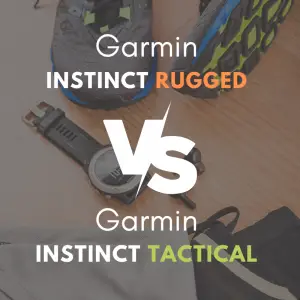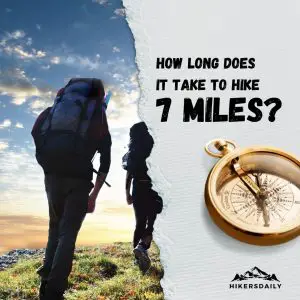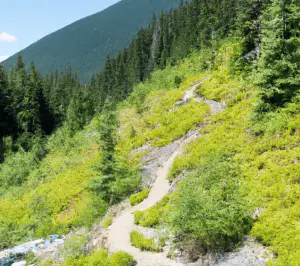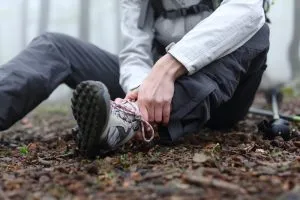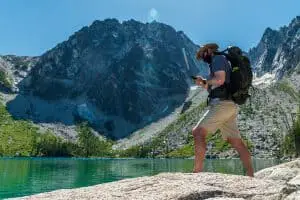Can You Hike With A Baby?
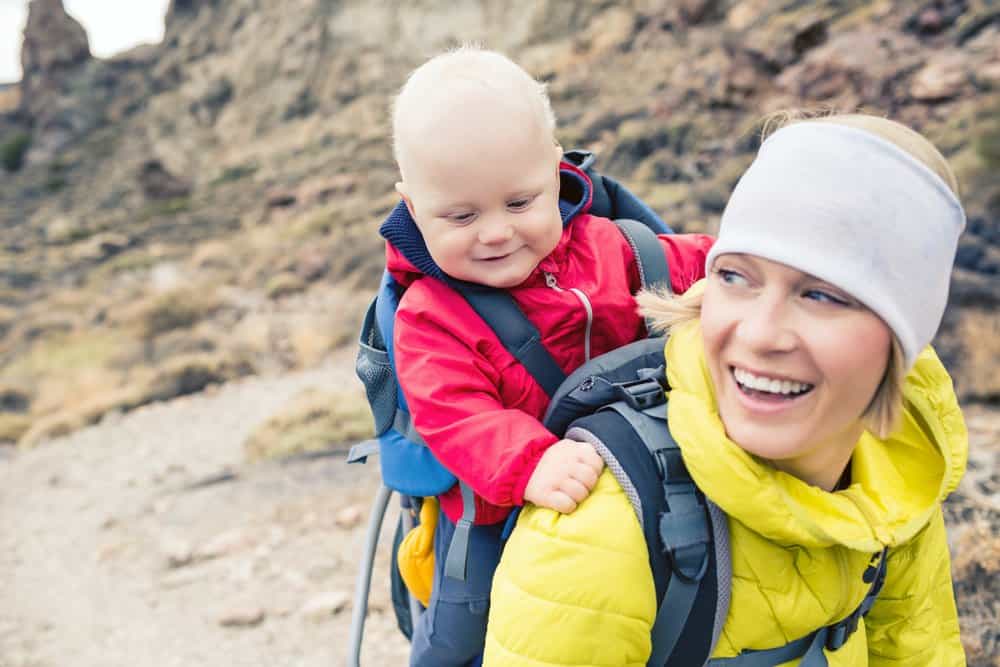
Before I became a father, I would have never thought the question, “can you hike with a baby?”, would cross my mind. I used to see it on the trails, quite often, actually. But I used to think those parents were crazy.
As it turns out, once you have a baby, everything changes.
All of a sudden, all of the things that you used to do become potential activities that you can do with your child.
That includes hiking.
Quick Links
Spending Time Outdoors with Your Newborn
Your pediatrician will most likely give you the go-ahead to take your newborn outside as soon as you feel up for it. Some will want to wait for vaccines, and that’s perfectly acceptable as well.
The fresh air will do you both good. My daughter’s mood completely changes as soon as we step outside. And, getting some Vitamin D is important for your baby’s health and growth.
Of course, you’ll still want to avoid crowded places and sick people. But, other than that, getting some fresh air is a great way to bond with your baby.
When it comes to hiking with a baby, you have to plan properly so you both can have a wonderful time hiking your favorite trails. Successfully hiking with your young one includes having the right baby hiking gear, knowing how to protect them, and understanding their limits.
Aside from the above information, there are many things you need to know and go along with to have safe and fun hiking with your baby. Keep reading to find out.
Can You Hike with A Baby?
Yes, you can go hiking with a baby. Like I said, with a bit of consideration and planning, you can make it work. And let’s be honest, you’re going to have to figure out a way sooner or later as a parent!
So, how do you plan for a hike with the baby? Below are some tips on how to get started.
- Dress For The Weather: Weather on trails is usually unpredictable and can often get quite cold, depending on the elevation – or quite warm if you’re hiking on trails without much shade. So what do you do? It’s always best to dress your baby in layers. A good rule of thumb is that your baby should always have one more layer than you. If you think your baby is getting a bit too warm on your trails, you can always remove a layer. But if you don’t have any other clothes for him or her, you won’t be able to add layers.
- Get A Sturdy Backpack: Get your baby used to sitting in a backpack. This process usually takes some time, as not all babies would be comfortable sitting in it at first. However, if you want to enjoy hiking trails with your baby, a backpack is necessary. I’ll be covering a great baby backpack below.
- Take Breaks: By breaks here, I do not mean the conventional diaper change or feeding break, take breaks that allow the baby to move around and explore. If they are too young for some walking, spend a bit of time playing, holding, and stretching their little legs. There are reports of increased risks with having your baby in a seated position for an extended period.
- Snacks (Lots of it): Ensure you bring along snacks that would be easy for them to munch while in the backpack. You could bring along something simple, like cookies and crackers – or your baby’s favorite healthy snack. These snacks can also work to keep them occupied while you trek on.
- Choose the right trail: Stay away from strenuous trails or trails with rough terrains and steep drops. There is absolutely no point in trying to climb something with steep elevations and your baby in tow. It will just be miserable for both of you. Instead, go for trails that have flat and smooth surfaces with very little incline. This would make it more enjoyable and manageable for your baby – and ultimately safer too! I would also recommend going for trails with good shade to avoid overexposing your newborn to sunlight.
Now that I’ve covered the basics, let’s take a look at some other items you might need for a hike with your baby.
Baby Hiking Gear: The Dos and Don’ts
There is a whole range of gear available in the market for hiking with your baby. However, not all of it would be necessary – and some might even do more harm than good. Let’s take a look at what you should and shouldn’t bring along.
Do Bring
A baby carrier or backpack: As I said, this is an absolute must if you’re planning on going for a hike with your baby. A carrier would allow you to keep your baby close to your chest – which can be very reassuring for both you and the baby. It also frees up your hands, so you can focus on the hike. If you choose to get a carrier, make sure it is comfortable and has good support for your back and shoulders. A baby backpack would be a great alternative if your baby is a bit older and can sit up on his or her own.
For baby carriers – I recommend the Baby Bjorn Baby Carrier. It’s comfortable and much easier to use/set up than others I’ve tried. One downside to a baby carrier is that your baby will most likely be pressed up against your chest the entire time – which can get quite hot on sunny days.
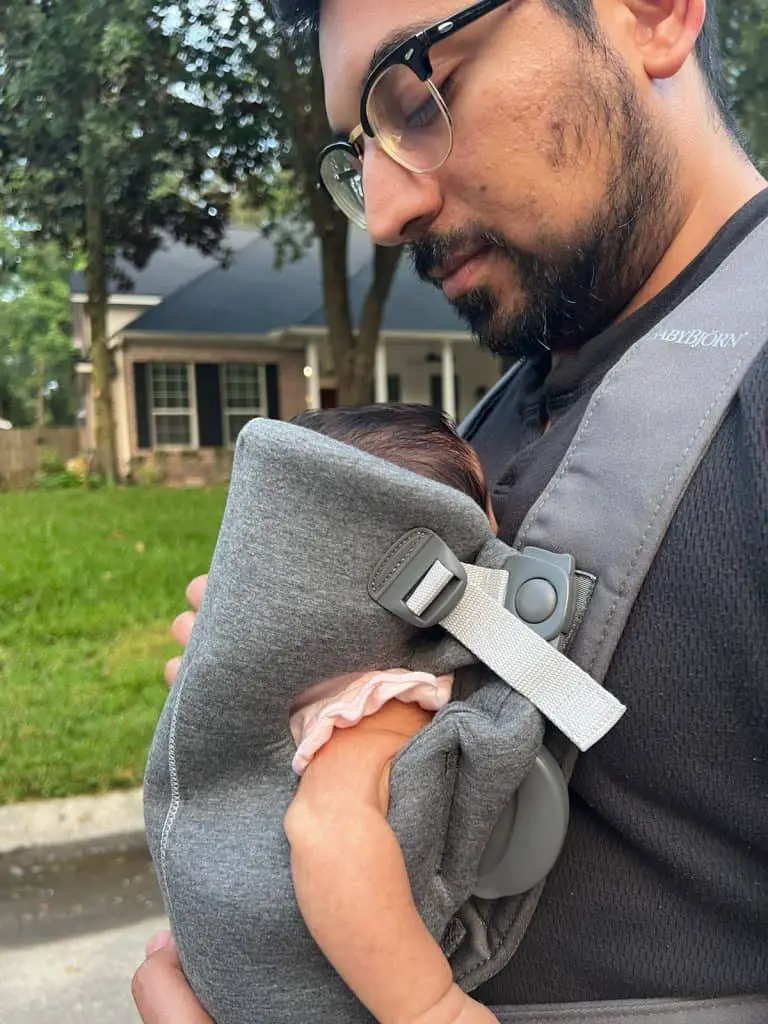
A sun hat: A wide-brimmed sun hat would be perfect to keep the sun off your baby’s face and neck. Make sure it is comfortable and fits snugly without being too tight.
Typically, most baby sun hats should be fine – as long as they fit. I recommend the Baby Sun Hat by I Play.
Sunscreen: Choose a sunscreen that is made specifically for babies and has an SPF of at least 30. Apply it generously on all exposed skin, including the back of the neck, hands, and feet.
I’m a fan of Coppertone’s sunscreen, so naturally, I would say to go for the Coppertone WaterBabies Sunscreen Lotion.
Bug spray: Bugs can be quite a nuisance – not to mention, some of them could carry diseases. So it is important to keep your baby protected from them. Look for a bug spray that is made specifically for babies and has natural ingredients like citronella oil.
If you are looking for a DEET-free option, check out this Babyganics DEET Free Bug Spray. It’s made with natural ingredients, such as Citronella Oil and Lemongrass Oil, which are known as natural repellents.
First aid kit: Ensure your first aid kit contains baby medications to avoid health complications during a hike. Besides a first aid kid, I would recommend looking into Little Remedies New Baby Essentials for travel-sized a nasal aspirator, gas relief drops, and more.
Extra clothes: Always bring spare clothes when hiking with a newborn. Remember, the weather can be unpredictable sometimes. And you never know when a diaper blowout can happen!
Baby care Essentials: Do not forget to pack items like wipes, disposable bags, and diapers. Pack as many of these items as can fit in your bag.
Don’t Bring
Toys: Now, this might be a bit of a controversial one. Some people might say that bringing along a few toys would help keep the baby occupied. However, I would say that it is best to avoid bringing along any toys. Why? Well, first of all, there is a chance your baby might drop the toy and you would have to stop to pick it up. That might be fine if you’re on a public street, but it can get quite dangerous on a trail.
Secondly, if the toy doesn’t end up on the ground, it might end up in their mouth. What do you do if you’re wearing a baby backpack? You’re not going to be able to see what they’re doing – and you definitely won’t be able to stop them from putting things in their mouths. So I say it is best to avoid toys altogether.
Stroller: This is a big no-no. There is no way you would be able to push a stroller on a hiking trail. Not only is it impractical, but it is also dangerous. Your baby could easily fall out or get injured if you’re not careful.
Now that you know what to bring and what not to bring, let’s take a look what age you can actually start bringing your little tot on the trails.
What Age Can You Start Hiking With A Baby?
You can start as soon as your baby weighs enough to support themselves in a baby carrier, which was 8 lb. That’s when we started. Keep in mind, that the trails were short and had little to no elevation gain.
Secondly, you need to make sure that your baby is healthy enough to be exposed to the outdoors. If your baby was born premature or has any underlying health conditions, it is best to wait until they are cleared by a doctor before taking them out on the hike. Definitely speak with your pediatrician if you have any concerns or reasons to believe that hiking might not be a good idea for your baby.
If you want to play it safe – you can start hiking with your baby after 6 months of birth. This coincides with the time your baby should be able to sit up comfortably, without external support. Being able to sit up translates to the baby’s ability to use and be comfortable in a hiking backpack.
However, the 6-month mark is not for everybody, some babies need more time, while some need less time, but the consensus is you can hike with your baby as soon as you feel confident enough to. Being confident here means confidence in your ability to keep your baby safe against all odds.
How Soon After Giving Birth Can You Go Hiking?
Switching gears a little bit, I just wanted to talk about hiking for women after giving birth. My wife started joining me on some easygoing, flat hiking trails around the same time that the baby did – which was around 6 weeks after giving birth.
Typically, early on hiking is roughly the same as hiking while pregnant during the third trimester. Low impact and low stress.
Since your pelvic floor and core need to recover, the earliest you can return to high-impact exercises like strenuous hiking and running is typically 3 months after birthing a child. However, you can perform low-impact exercises from the time of birth.
Please note that diving right into high-impact exercises immediately after birth can result in health complications for you. These complications include; pelvic pain, pelvic organ prolapse, urinary/fecal incontinence, and abdominal wall dysfunction.
When you get back into hiking, make sure to take it slow. Do not start with intense hikes. Instead, start with short and flat hikes and work your way back up to more challenging hikes.
The Best Baby Backpack For Hiking
A baby backpack should be the first baby hiking gear on your list. There are two types of baby backpacks;
- Framed Carrier
- Lightweight or Urban carriers
The framed carriers are more rugged and made from aluminum frames. Most of them feature storage spaces to enable you to carry baby supplies like water, diapers, wipes, and water.
On the other hand, lightweight or urban carriers look like a regular backpack but with a structured framework for your child. This type is less bulky, making them easy to pack for short trips.
Buying a heavy backpack increases the difficulty of carrying your child. However, before heading out, kindly note that baby backpack carriers are for children that can sit up without support. They are usually for babies 6 months old with full head and neck control.
As far as recommendations, the Deuter Kid Comfort Child Carrier and Backpack is probably the best on the market. It’s a bit on the pricy side, but worth every penny if you plan on hiking often with your child.
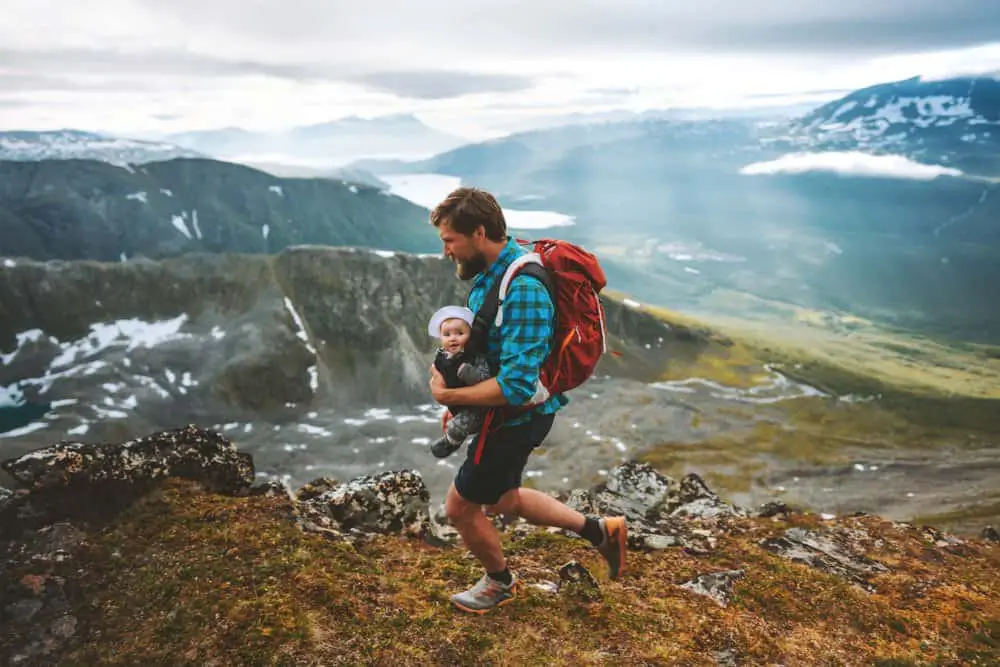
Can Babies Sleep In A Hiking Backpack?
Yes, a baby can sleep in a backpack with accessories that encourage baby sleeping. These accessories include hoods or straps that hold up a sleeping baby’s head. The Deuter Kid Comfort Backpack, mentioned above, contains these accessories and is made with extremely comfortable material. You can use baby backpacks with these accessories both in the front and back.
For backpacks without these accessories, keep a sleeping baby in front. This lets you keep the baby’s head in check if it sleeps as you hike.
How Do I Keep My Baby Cool While Hiking?
A very real concern is overheating. How do you keep your baby cool in a hot environment like hiking? Especially when it’s recommended for your baby to wear multiple layers.
There are a couple of things you can do to reduce the risk of overheating:
- Wear light-colored and loose-fitting clothes. The air will be able to circulate better, and your baby’s skin won’t be in contact with too much fabric.
- Make sure there is enough airflow. If you’re using a baby carrier that has a sunshade, make sure to open it up from time to time, or take it off when you feel it’s getting too hot.
- Keep an eye on your baby for signs of overheating. These include; flushed cheeks, sweating, rapid breathing, and fussiness.
- Get them wet! You can do this using a natural water source or with a splash of water that you brought along for hiking.
Lastly, if you plan on wearing a baby carrier, note that the further away a baby is from your body heat, the cooler they become. So if you have to wear a baby carrier, make sure to dress your baby appropriately.
And if you notice any of the signs of overheating, find a shady spot and give your baby a break.
How Can I Get My Child To Hike?
Just because your child is attached to your hip as the years go by, doesn’t mean they will love hiking right away. Getting your child to enjoy hiking is a process and requires a lot of patience. Below are tips on how you can get your child to start enjoying the outdoors:
Start Early, Start Small
If you plan on making hiking one of your child’s favorite pastimes, you have to introduce it to them at a younger age. If your kids are a bit older already, start hiking with short treks close to home.
Know The Route
Knowing the route includes researching the elevation gain and difficulty of the terrain. Don’t make the mistake of looking at a trail, seeing only one mile in length, and thinking you’re in the clear. Always consider your child’s experience when choosing a route. Go from easy to moderate and then difficult terrains. And of course, try and choose trails that have ample shade.
Be Ready To Change Plans
When you want your child to love hiking as much as you do, you have to be flexible with your schedule. Always set hiking goals with your child in mind. Be always prepared for unforeseen circumstances and know how to react to them.
Benefits Of Hiking With A Baby
So, is hiking with a baby worth the hassle? Yes, it is worth every second. The benefits of hiking with a baby or young child are numerous. Below are some benefits.
Helps You Leave The House
The period after the birth of a child is often isolating for parents. The reality of a child’s needs hit us so hard that most times, we transition from outgoing people to barely keeping up with daily living. Hiking with your baby helps you leave the house and become more active.
Fosters Parental Bonding
Children always want to spend quality time with their parents. Hiking with your child or children on a peaceful trail affords you this alone time and sets the tone for strong parental bonding. The same goes for infants. Although infants obviously can’t talk yet, they can communicate non-verbally, and you better believe they’re transmitting their love & appreciation.
Exercise
There is no doubt that exercise is good for the body and mind, but sometimes we lack the motivation to do it. When you hike with your baby, your body gets the exercise it needs, and you feel refreshed. And let me tell you, I really underestimated the core workout of carrying a baby, but it felt great! It was very similar to hiking with a weighted vest, which I can strongly recommend for a great cardio workout.
Avenue To Meet New People
Hiking with your baby allows you to meet new people. People interested in baby care would ask questions, while already established parents can potentially offer invaluable advice. Who knows, you could create a bond or friendship that lasts a lifetime.
What About Hiking Alone With A Baby?
If you really want to go hiking alone with your baby, I would stick to shorter, easier hikes, and nearby trails to your home.
Even though some enjoy hiking alone, when it comes to hiking alone with a baby, it’s not for everyone. If you choose to hike alone with your baby, make sure you’re comfortable with all the risks before hitting the trail.
My recommendation is to take your partner or friend along. They would help lift the load of carrying the baby alone off your shoulder. It also pays to have somebody to help if things go wrong during the hike.
Conclusion
Hiking with your baby is an excellent bonding experience. It’s also great for your baby’s development. However, before heading out, make sure you’re prepared, follow my tips, and bring the right gear.
Lastly, enjoy the wonderful time!

